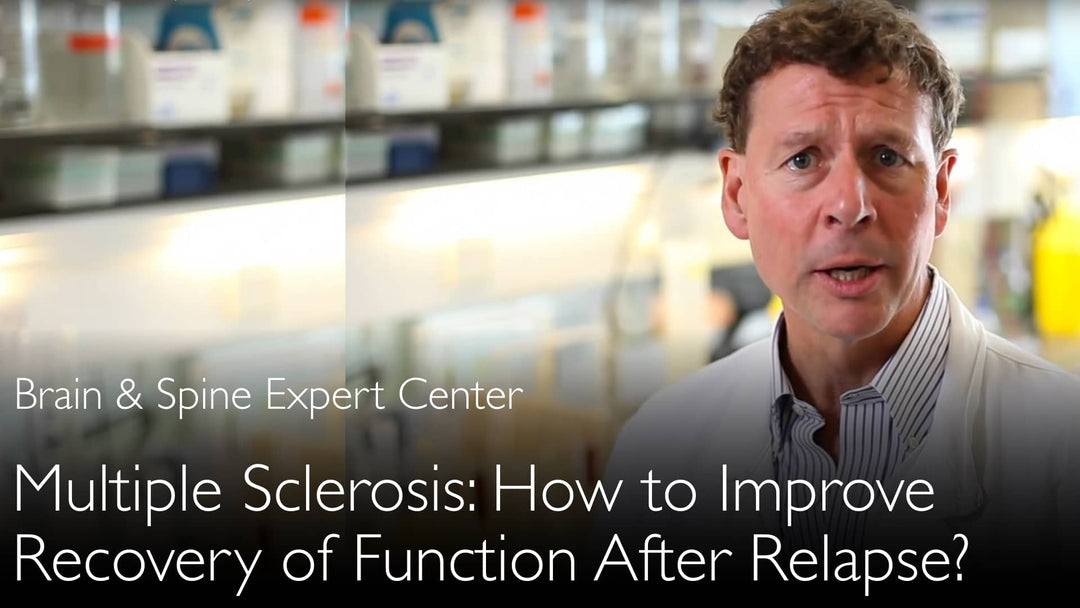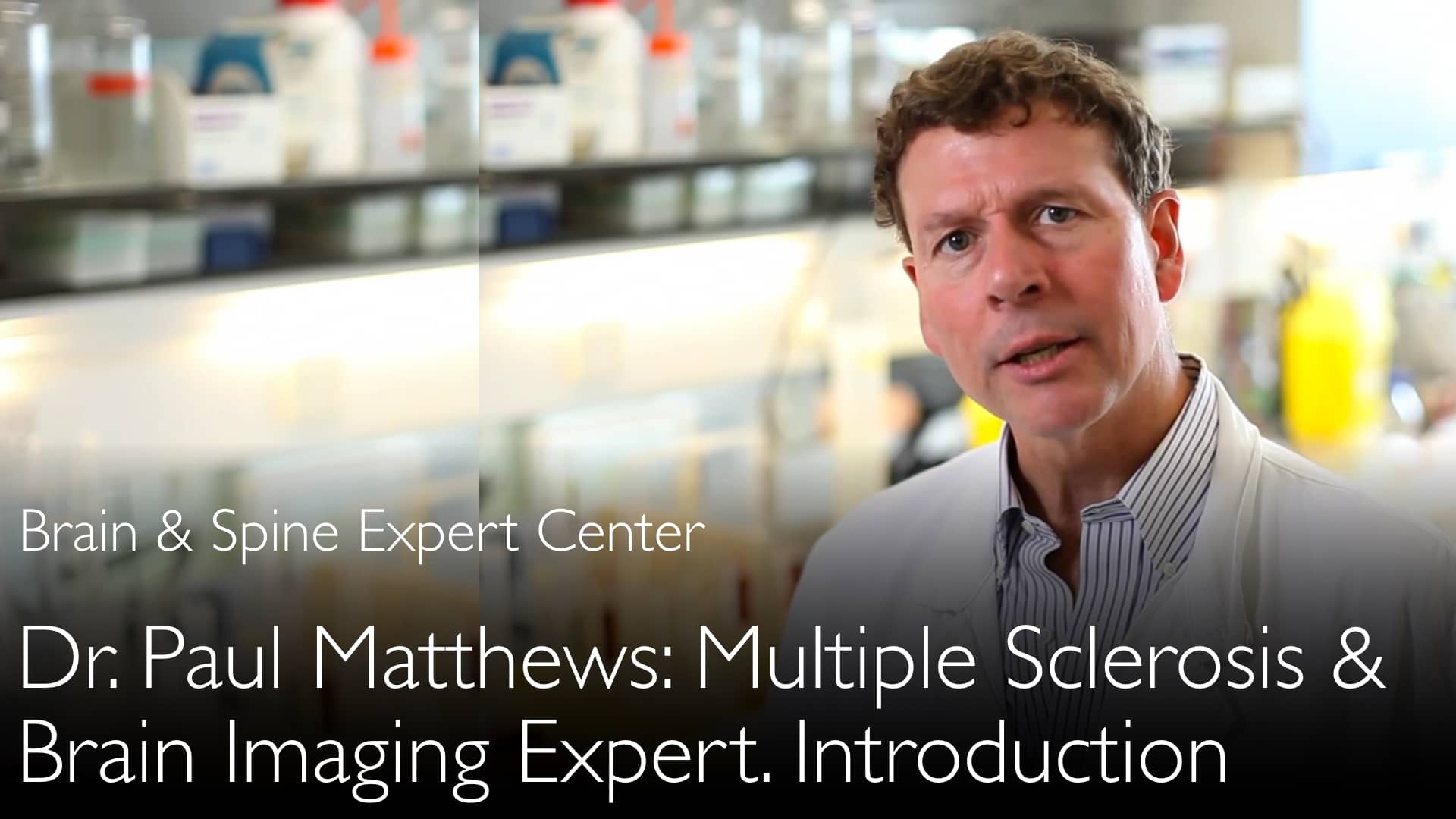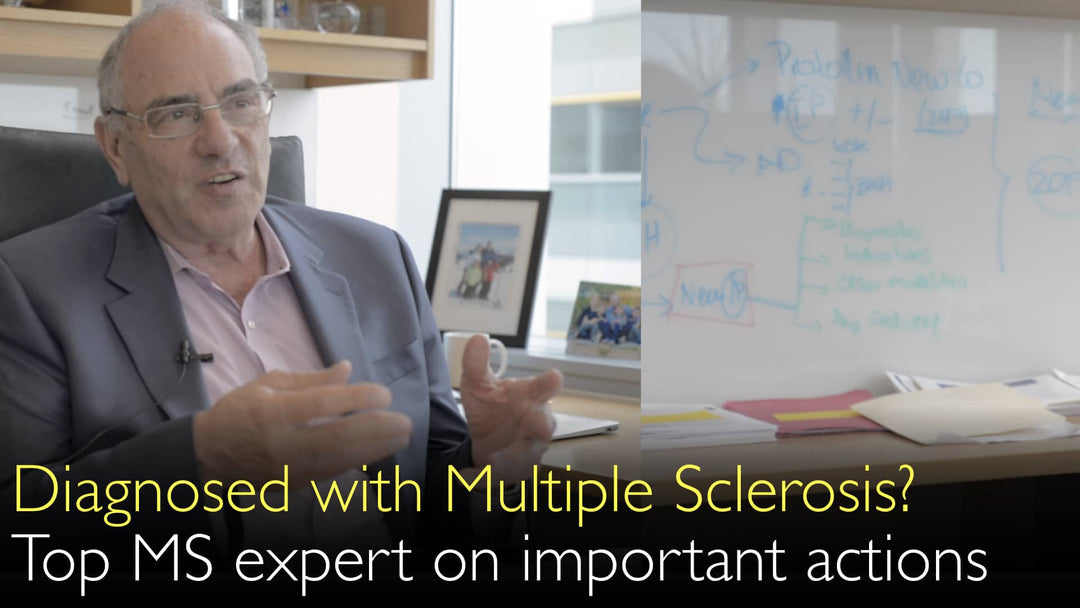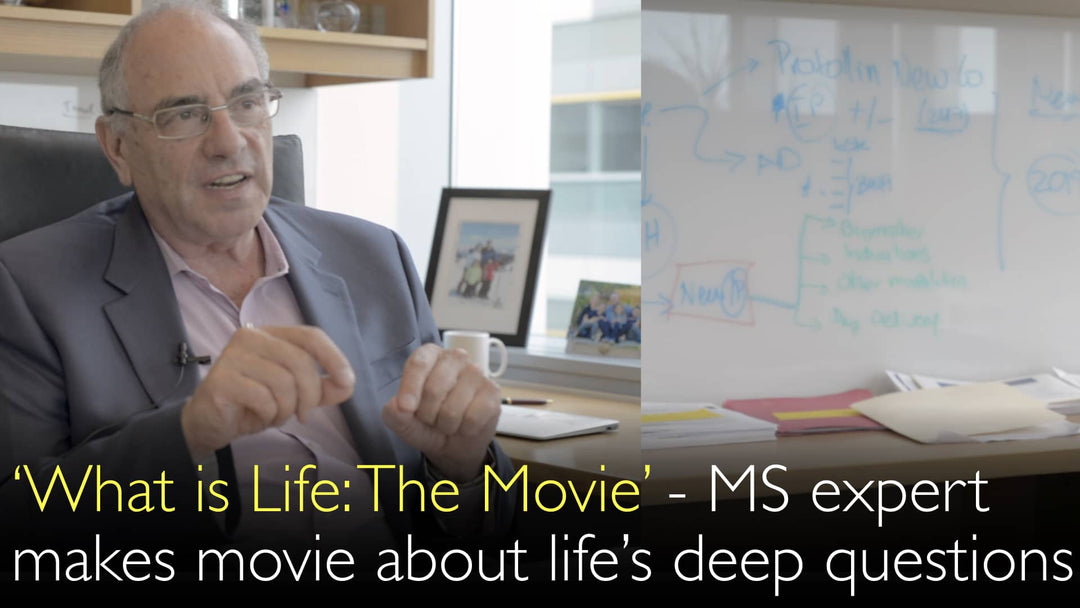Le docteur Paul Matthews, spécialiste de renom dans le traitement de la sclérose en plaques, décrit comment les fonctions neurologiques se rétablissent après une poussée. Il met en lumière l’extraordinaire plasticité et la redondance du cerveau. Les mécanismes de récupération comprennent la réparation neuronale, la remyélinisation et la compensation fonctionnelle. La neurorééducation optimise ce processus naturel grâce à des exercices répétés. Le concept de non-utilisation apprise souligne la nécessité de continuer à mobiliser les membres. Ces principes s’appliquent également à d’autres maladies neurodégénératives, comme Alzheimer et Parkinson.
Mécanismes de récupération neurologique après une poussée de sclérose en plaques
Aller à la section
- La sclérose en plaques en tant que maladie neurodégénérative
- Mécanismes de réparation neuronale et de remyélinisation
- Compensation fonctionnelle cérébrale
- Comment la neurorééducation améliore la récupération
- Le concept de non-utilisation apprise
- Directions futures de la recherche sur la récupération dans la SEP
- Transcript intégral
La sclérose en plaques en tant que maladie neurodégénérative
Le docteur Paul Matthews, MD, souligne que la sclérose en plaques est fondamentalement une maladie neurodégénérative. Ses travaux ont mis en lumière l’importance cruciale de la perte neuronale et axonale après les poussées de SEP. Cette découverte a transformé la compréhension de la SEP, qui ne peut plus être considérée comme une simple maladie auto-immune. La perte des cellules nerveuses et de leurs connexions constitue une caractéristique centrale de la maladie. Ce processus neurodégénératif affecte directement les capacités fonctionnelles à long terme du patient.
Mécanismes de réparation neuronale et de remyélinisation
La récupération fonctionnelle après une poussée de SEP repose sur plusieurs mécanismes biologiques. Le docteur Paul Matthews, MD, explique que lorsque les axones subsistent, une réparation neuronale est possible. La remyélinisation des axones est un autre processus clé qui peut restaurer la fonction neurologique. Cette réparation permet aux neurones de retrouver leurs fonctions altérées et de maintenir leurs performances sur le long terme. Toutefois, le docteur Paul Matthews, MD, note que de nombreux axones et neurones subissent des lésions irréversibles et finissent par mourir.
Compensation fonctionnelle cérébrale
Le cerveau possède une redondance remarquable qui permet une compensation fonctionnelle. Le docteur Paul Matthews, MD, décrit comment chaque cellule nerveuse compte environ 10 000 connexions synaptiques. Ce réseau dense et interconnecté permet aux neurones de se substituer les uns aux autres. Même en cas de lésion, ce réseau favorise une récupération fonctionnelle significative. Les zones de contrôle d’ordre supérieur du cortex préfrontal contribuent à allouer les ressources entre les différentes régions cérébrales.
Comment la neurorééducation améliore la récupération
La neurorééducation joue un rôle essentiel dans l’optimisation des processus naturels de récupération cérébrale. Le docteur Paul Matthews, MD, explique que la pratique répétée des tâches affectées conduit à une amélioration progressive. Grâce à l’expérience et à l’apprentissage continu, le cerveau développe de nouvelles stratégies pour compenser la perte de cellules nerveuses. Cela peut impliquer l’expansion des régions cérébrales responsables du mouvement ou de la sensation. Le docteur Anton Titov, MD, aborde comment ces principes aident les patients à retrouver des capacités comme la marche ou la préhension d’objets.
Le concept de non-utilisation apprise
Le concept de « non-utilisation apprise » influence considérablement les résultats de la récupération dans la sclérose en plaques. Le docteur Paul Matthews, MD, avertit que si un patient n’utilise pas un membre atteint, sa fonction risque de ne pas se rétablir complètement. Ce principe, initialement issu des essais cliniques sur les AVC, s’applique également à la SEP. La non-utilisation apprise peut entraver le développement de stratégies compensatoires par le cerveau. L’utilisation active des membres affectés est donc cruciale pour une récupération neurologique optimale.
Directions futures de la recherche sur la récupération dans la SEP
Les futures recherches sur la sclérose en plaques se concentreront sur la compréhension des déterminants moléculaires de la récupération cérébrale. Le docteur Paul Matthews, MD, décrit ce domaine comme particulièrement prometteur pour l’exploration scientifique. Les chercheurs visent à comprendre comment les cerveaux pourraient être câblés différemment avant l’apparition de la SEP. Ces connaissances pourraient aider à prédire quels patients sont plus susceptibles de connaître une récupération fonctionnelle réussie. Le docteur Anton Titov, MD, souligne que ces informations permettront d’établir de meilleurs pronostics pour les patients atteints de SEP.
Transcript intégral
Dr. Anton Titov, MD: Vous avez apporté de nombreuses contributions scientifiques majeures dans le domaine de la sclérose en plaques. L’une d’elles est la découverte de l’importance de la perte neuronale et axonale dans la sclérose en plaques. Ceci fait de la sclérose en plaques une maladie neurodégénérative, et non pas « seulement » une maladie auto-immune.
Il y a une perte de neurones et d’axones après les poussées de sclérose en plaques. Ceci implique un mécanisme efficace de récupération de la fonction cérébrale chez les patients atteints de sclérose en plaques rémittente.
Dr. Paul Matthews, MD: Nous avons déjà évoqué la sclérose en plaques rémittente. Il est connu que les patients atteints de cette forme conservent très bien et longtemps leurs capacités fonctionnelles.
Dr. Anton Titov, MD: Nous savons que les axones et les neurones sont perdus après une poussée de sclérose en plaques. Comment se produit la récupération des fonctions neurologiques après les poussées dans la SEP ?
Dr. Paul Matthews, MD: La récupération fonctionnelle après les poussées peut survenir par divers mécanismes. Lorsque des substrats axonaux persistent, la réparation neuronale est possible. La remyélinisation des axones peut se produire, permettant aux neurones de retrouver leurs fonctions altérées.
Les neurones peuvent ainsi maintenir leur fonction à plus long terme. Cependant, de nombreux axones sont endommagés de manière irréversible, et de nombreux neurones subissent des lésions définitives. Les cellules nerveuses meurent dans la sclérose en plaques.
Nous en avons déjà parlé. Dans ces cas, le cerveau utilise sa redondance extraordinaire pour assurer la récupération de la fonction neurologique. Chaque cellule nerveuse possède environ 10 000 connexions synaptiques, chacune interagissant avec un nombre similaire d’autres cellules nerveuses.
Ceci permet la création d’un réseau riche de cellules nerveuses dans le cerveau. Les neurones peuvent se substituer les uns aux autres au sein d’un système fonctionnel donné, et ce, de manière significative, même en présence de lésions.
Cette compensation fonctionnelle dans la sclérose en plaques est un processus spontané, mais elle peut être renforcée par l’expérience et l’apprentissage continu.
Dr. Anton Titov, MD: C’est le rôle de la neurorééducation dans la sclérose en plaques. Il peut être très difficile de marcher ou de saisir un objet immédiatement après une poussée.
Dr. Paul Matthews, MD: La pratique répétée d’une tâche, comme la préhension ou la marche, s’améliore progressivement. Le cerveau apprend de nouvelles façons de s’adapter à la perte de cellules nerveuses.
Cela peut se manifester par l’expansion de la région du cerveau responsable du contrôle du mouvement ou de la perception des sensations. Dans certains cas, des zones fonctionnellement liées assument des tâches supplémentaires, comme on l’observe dans le cortex visuel.
Cette compensation de la fonction neurologique peut être optimisée par les zones de contrôle d’ordre supérieur du cerveau. Il existe des « zones de contrôle » dans le cortex préfrontal, responsables de l’allocation des ressources pour des tâches données entre des zones cérébrales hiérarchiquement inférieures.
Ces zones du cerveau sont dédiées à l’action ou à la perception. La récupération devient imparfaite à un certain stade, lorsque la zone du cerveau en dehors de la nouvelle lésion présente elle-même des dommages plus importants.
Ces dommages accrus sont associés à une résilience réduite. Plus les lésions cérébrales sont importantes dans la sclérose en plaques, plus la capacité de reprogrammation diminue.
Cela dépend aussi beaucoup de l’expérience. Ainsi, si un patient n’utilise pas un membre atteint, les fonctions de ce membre peuvent ne pas récupérer autant qu’elles l’auraient fait autrement, voire pas du tout.
Dr. Anton Titov, MD: C’est le concept de « non-utilisation apprise ». Tous ces principes proviennent initialement d’essais cliniques chez des patients ayant subi des AVC, où une lésion isolée unique pouvait être étudiée en l’absence d’autres dommages cérébraux.
Dr. Paul Matthews, MD: Mais je pense que c’est un principe de récupération de la fonction cérébrale qui s’étend désormais à toute une gamme de maladies neurodégénératives. Il est maintenant appliqué à des maladies aussi diverses que la maladie d’Alzheimer et la maladie de Parkinson.
Dr. Anton Titov, MD: Nous devons comprendre la capacité des patients à maintenir des niveaux de comportement relativement normaux pendant des périodes prolongées. La sclérose en plaques témoigne véritablement des capacités adaptatives et de la plasticité du cerveau, face aux dommages immunologiques et neurodégénératifs.
Dr. Paul Matthews, MD: Je le pense. Un domaine passionnant pour la recherche future sur la sclérose en plaques est celui-ci : comprendre les déterminants moléculaires de cette récupération adaptative de la fonction cérébrale.
Comment les cerveaux pourraient être câblés différemment avant le développement de la sclérose en plaques, rendant cette récupération plus probable.
Dr. Anton Titov, MD: Avec ces informations, nous pourrons établir de meilleurs pronostics pour les patients atteints de sclérose en plaques à l’avenir.








